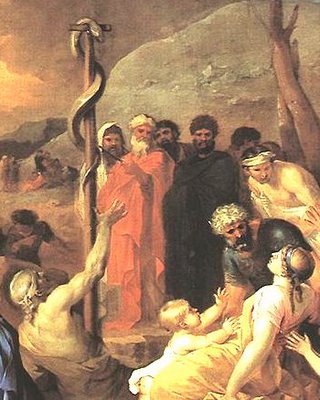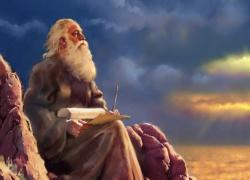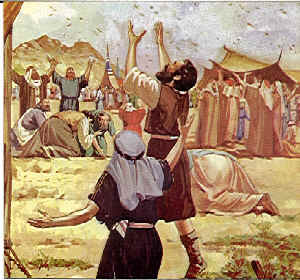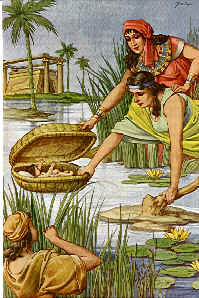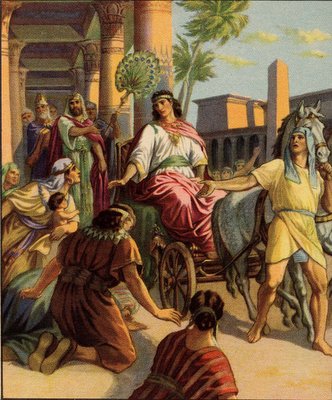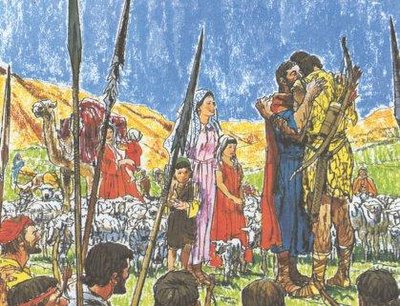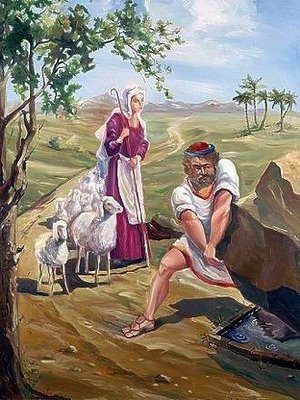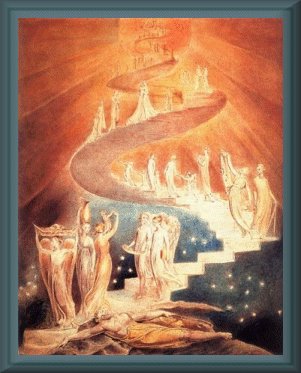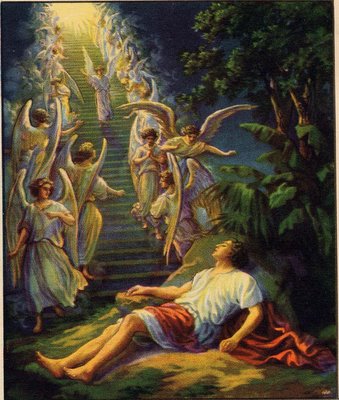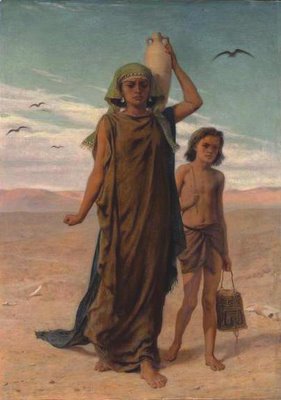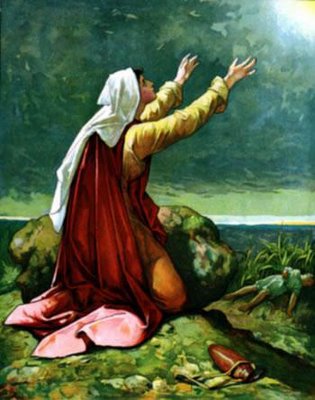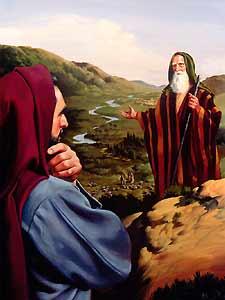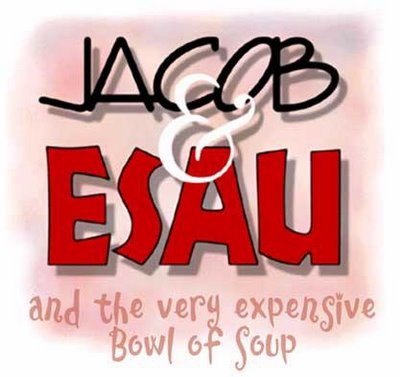 Isaac, the son of Abraham, married a woman named Rebekah. She gave birth to twin boys, Esau and Jacob, Esau being the older one.
Isaac, the son of Abraham, married a woman named Rebekah. She gave birth to twin boys, Esau and Jacob, Esau being the older one.
Jacob was quiet and thoughtful, staying at home, dwelling in a tent, and caring for the flocks of his father. Isaac loved Esau more than Jacob, because Esau brought to his father that which he had killed in his hunting; but Rebekah liked Jacob, because she saw that he was wise and careful in his work.
Among the people in those lands, when a man dies, his older son receives twice as much as the younger of their father’s possessions. This was called his "birthright," for it was his right as the oldest born. So Esau, as the older, had a “birthright” to more of Isaac’s possession than Jacob. And besides this, there was the privilege of the promise of God that the family of Isaac should receive great blessings.
The Sale Of A Birthright
Esau, when he grew up, did not care for his birthright or the blessing which God had promised. Jacob, who was a wise man, wished greatly to have the birthright which would come to Esau when his father died.
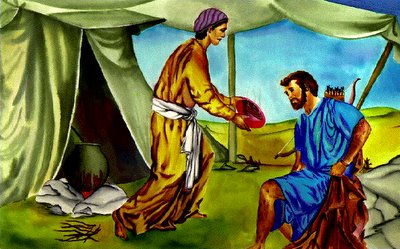
Once, when Esau came home, hungry and tired from hunting in the fields, he saw that Jacob had a bowl of something that he had just cooked for dinner. And Esau said, "Give me some of that soup in the dish. Will you not give me some? I am hungry." And Jacob answered, "I will give it to you, if you will first of all sell to me your birthright." Esau said, "What is the use of the birth-right to me now, when I am almost starving to death? You can have my birthright if you will give me something to eat."
Esau made Jacob a solemn promise to give to Jacob his birthright, all for a bowl of soup. It was not right for Jacob to deal so selfishly with his brother but it was very wrong in Esau to care so little for his birthright and God's blessing.
Some time after this, when Esau was forty years old, he married two wives. Though this would be very wicked in our times, it was not supposed to be wrong then; for even good men then had more than one wife. But Esau's two wives were women from the people of Canaan, who worshipped idols, and not the true God. And they taught their children also to pray to idols, so that those who came from Esau, the people who were his descendants, lost all knowledge of God, and became very wicked.
Isaac and Rebekah were very sorry to have their son Esau marry women who prayed to idols and not to God; but still Isaac loved Esau more than Jacob. Isaac became very old and feeble, and so blind that he could see scarcely anything. One day he said to Esau, "My son, I am very old, and do not know how soon I must die. But before I die, I wish to give to you, as my older son, God's blessing upon you, and your children, and your descendants. Go out into the fields, and with your bow and arrows shoot some animal that is good for food, and make for me a dish of cooked meat such as you know I love and after I have eaten it I will give you the blessing."
Esau should have told his father that the blessing did not belong to him, for he had sold it to his brother Jacob. But he did not tell his father. He went out into the fields hunting, to find the kind of meat which his father liked the most.
Rebekah was listening, and heard all that Isaac had said to Esau. She knew that it would be better for Jacob to have the blessing than for Esau. So she called to Jacob and told him what Isaac had said to Esau, and she said, "Now, my son, do what I tell you, and you will get the blessing instead of your brother. Go to the flocks and bring to me two little kids from the goats, and I will cook them just like the meat which Esau cooks for your father. And you will bring it to your father, and he will think that you are Esau, and will give you the blessing and it really belongs to you."
Jacob said, "You know that Esau and I are not alike, His neck and arms are covered with hairs, while mine are smooth. My father will feel of me, and he will find that I am not Esau and then, instead of giving me a blessing, I am afraid that he will curse me."
Rebekah answered her son, "Never mind, you do as I have told you, and I will take care of you. If any harm comes it will come to me, so do not be afraid, but go and bring the meat."
Jacob went and brought a pair of baby goats from the flocks. His mother made a dish of food, so that it would be to the taste just as Isaac liked it. Then Rebekah found some of Esau's clothes, and dressed Jacob in them and she placed on his neck and hands some of the skins of the goats, so that his neck and his hands would feel rough and hairy to the touch.
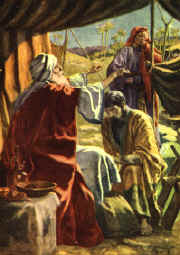
Jacob went into his father's tent with the dinner, and speaking as much like Esau as he could, he said: "Here I am, my father." And Isaac said, "Who are you, my son?" Jacob answered, "I am Esau, your oldest son; I have done as you told me, now sit up and eat the dinner that I have made, and then give me your blessing as you promised me." Isaac said, "How is it that you found it so quickly?" Jacob answered, "Because the Lord your God showed me where to go and gave me good success."
Isaac did not feel certain that it was his son Esau, and he said, "Come near and let me feel you, so that I may know that you are really my son Esau. Jacob went up close to Isaac's bed, and a Isaac felt of his face, and his neck, and his hands, and he said, "The voice sounds like Jacob, but the hands are the hands of Esau. Are you really my son Esau?"
Jacob told a lie to his father, and said, "I am." Isaac ate the food that Jacob had brought to him; and he kissed Jacob, believing him to be Esau; and he gave him the blessing, Saying to him, "May God give you the dew of heaven, and the richness of the earth, and plenty of grain and wine. May nations bow down to you and peoples become your servants. May you be the master over your brother, and may your family and descendants that shall come from you rule over his family and his descendants. Blessed be those that bless you, and cursed be those that curse you."
When Jacob had received the blessing he rose up and hastened away. He had scarcely gone out, when Esau came in from hunting, with the dish of food that he had cooked. And he said: "Let my father sit up and eat the food that I have brought, and give me the blessing."
Isaac said, "Why, who are you?” Esau answered, "I am your son; your oldest son, Esau." Isaac trembled, and said, "Who then is the one that came in and brought to me food? and I have eaten his food and have blessed him, yes, and he shall be blessed."
When Esau heard this, he knew that he had been cheated, and he cried aloud, with a bitter cry, "O, my father, my brother has taken away my blessing, just as he took away my birthright! But cannot you give me another blessing, too? Have you given everything to my brother?"
So Isaac told him all that he had said to Jacob, making him the ruler over his brother. But Esau begged for another blessing. Isaac said: "My son, your dwelling shall be of the riches of the earth and of the dew of heaven. You shall live by your sword and your descendants shall serve his descendants. But in time to come they shall break loose and shall shake off the yoke of your brother's rule and shall be free."
All this came to pass many years afterward. The people who came from Esau lived in a land called Edom, on the south of the land of Israel, where Jacob's descendants lived. And after a time the Israelites became rulers over the Edomites and later the Edomites made themselves free from the Israelites. This took place hundreds of years afterward.
It was better that Jacob's descendants, those who came after him, should have the blessing, than that Esau's people should have it, for Jacob's people worshipped God, and Esau's people walked in the way of the idols and became wicked.
